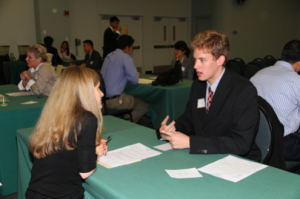How to Ace a Job Interview
- At March 18, 2016
- By rbadmin
- In Blog
 0
0
Job interviews stress everyone out, but preparing yourself materially and psychologically will go a long way toward making you feel better about the experience and boosting your odds of success.
Prepare. Make a list of typical interview questions and likely questions and write down your answers. Edit your answers and polish them until you get them exactly right. Then read your answers out loud over and over and over again.
The purpose here isn’t to memorize a fragmented speech one paragraph at a time. In fact, you’re better off not memorizing your answers because the questions you actuall get are likely to differ somewhat from your practice questions. You don’t want to come across like a robotic politician with rehearsed talking points.
The purpose of this exercise is to focus and organize your thoughts in advance so you won’t have to figure out what you want to say when you’re on the spot.
Ask Your Own Questions. Be sure to also write down some of your own questions in advance and ask them during the interview. Make sure they’re the kinds of questions that aren’t likely to come up in conversation until you ask.
This may not seem important, but it is for a couple of reasons. The last thing you should want is a job that you’ll hate, so you need to make sure it’s a good fit for you. If you learn from asking the right questions that it’s not going to work, consider yourself lucky. It’s far better to wait for the right job than to take one that will make you miserable. Remember, you’re going to work there for at least for a couple of months and probably for a couple of years.
If, on the other hand, you learn from your questions that the job is a good fit, that will come across. The interviewer will notice. You will seem—and be—more genuinely interested and engaged that most interviewees who just passively sit there.
Relax. Few people are truly relaxed during a job interview, but you’ll be a lot less stressed if you keep a couple of things in mind.
You are not on trial. Job interviewers are on your side. They need you, they want to hire you, and they’re predisposed to like you. They wouldn’t have called you and set up an interview in the first place if they thought you were wrong for the job.
They also expect you to be nervous. Everyone is nervous during job interviews. They’re just people. They’ve been interviewed, too. They know what it’s like. And you might be surprised by how many employers are nervous while they’re asking you questions.
So don’t fight the anxiety. That only makes it worse. Just let it be there. Don’t worry if you think you look nervous. You’re probably hiding it better than you think, and even if you aren’t, so what? No employer will ever hold it against you.
Be Yourself. This is the hardest part for some people. We want to make a good first impression and often feel like we need to present a superhuman version of ourselves. That makes a lot us nervous, but coming across as a braggart and phony is even worse.
Do this instead. Imagine you’ve been on the job for six months. You know everybody in the office. You see them at lunch and occasionally after hours. You’re good at your job because you’ve been doing it for a while now. Spend some time imagining how it would feel to be completely comfortable with everything and everyone. You’re only pretending for now, but if you’re hired, you’ll feel that way for real after a while. You know this is true because it has happened at every job you’ve ever had in your life.
Here’s a secret: there is a part of your brain that makes no distinction between things that are real and things that are imagined, and that part of your brain is partly responsible for your emotional state. It’s why horror movies are scary even though we know they’re not real.
Actors and actresses use this in their craft. They can imagine a gut-wrenching scene, or remember something tragic that has happened to them in real life, and make themselves cry. They are feeling genuine sadness when they do this.
Positive emotions can be conjured the same way. You can make yourself feel confident and at ease just by imagining yourself confident and at ease. So think of your interview as an acting performance. You’re sort of playing a role, but not really. You’re playing yourself. You’re playing yourself in the future, after you’re comfortable with the job and comfortable with your boss and comfortable with your co-workers.
Do this, and the interviewer won’t see a nervous version of yourself or a puffed up version of yourself, but the real you, the actual person they’ll work with every day after you’re hired and get settled in. You will come across as authentic because you will be authentic. You’ll exude confidence and competence, and you’re more likely to get hired.

